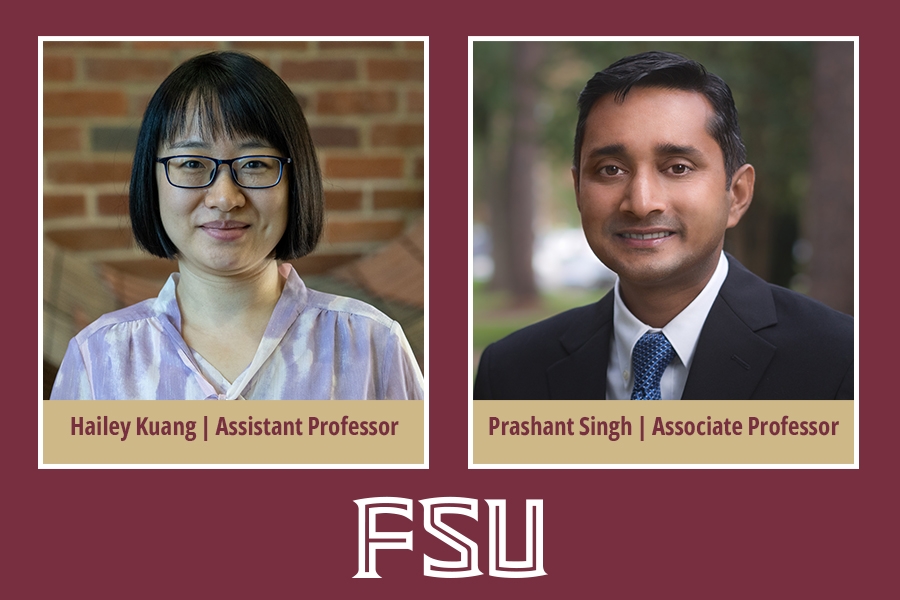
Two Florida State University College of Education, Health, and Human Sciences professors have been awarded food safety grants by the U.S. Department of Agriculture.
Prashant Singh's and Hailey Kuang's two-year grants will propel their research and help position FSU as a national leader in food safety innovation.
Kuang, an assistant professor of measurement and statistics in the Department of Education Psychology and FSU's Learning Systems Institute, was awarded a $150,000 grant that applies artificial intelligence to address global food safety challenges.
Singh, a health, nutrition and food science associate professor, received a $150,000 grant aimed at developing a method to detect salmonella contamination in beef samples.
Both grants are sponsored by the National Institute of Food and Agriculture.
Kuang's focus addresses areas that contain antimicrobial resistance (AMR), one of the top global public health and development threats. According to the World Health Organization, misuse of antimicrobials in humans, animals and plants is the main driver in the development of drug-resistant pathogens.
"Our project, 'AI4Food: Artificial Intelligence for Food Science Research and Education Initiative,' positions FSU as a pioneer in integrating AI technologies with food safety research," Kuang said.
"Our project, 'AI4Food: Artificial Intelligence for Food Science Research and Education Initiative,' positions FSU as a pioneer in integrating AI technologies with food safety research."
– Hailey Kuang, assistant professor of measurement and statistics in the Department of Education Psychology and FSU's Learning Systems Institute
Kuang's goal is to develop an AI-enabled portable sensor that rapidly detects AMR in food supply chains. The research involves designing a portable device to assist in AMR testing, training machine-learning algorithms to identify AMR testing and validating the performance of machine-learning sensors for AMR detection by using meat and fresh produce as food models.
"By enhancing efforts to combat antimicrobial resistance - a growing global health threat - this technology makes FSU a leader in advanced food safety innovation," Kuang said.
The outcome of her work could educate the students who specialize in food science and food safety. Kuang's research has the potential to create a comprehensive program that equips students with cutting-edge AI, sensing techniques and food safety expertise.
Kuang specializes in developing and applying psychometric and statistical methods to measure cognitive and psychological traits and also collaborates with scholars across many disciplines, including food science.
Singh's grant includes research-based and educational components in containing salmonella, one of the largest threats facing the global food industry. His research will be used to develop a novel digital PCR assay for the beef industry to measure the amount of salmonella contamination in samples.
A food safety microbiologist by training, Singh's core area of research focuses on the development of rapid methods to detect foodborne pathogens. His work has been published in more than 30 food science publications.
Singh said the additional USDA funding enables his team to expand their research and develop solutions the food industry needs.
"Only three commercially available test kits for testing salmonella load in food samples are available," Singh said. "These commercially available kits suffer from reproducibility issues and complicated DNA isolation protocols. The assay developed in our lab solves these problems, is highly reproducible and is suited for high throughput industrial applications. The workflow developed through this grant can be expanded to other food commodities, enabling a bigger impact."
His research is aimed at creating a faster development of robust foodborne pathogen detection.
By creating a standardized testing method, Singh is serving a wide user base that includes small and large food processors, federal laboratories, third-party testing laboratories, as well as students.
FSU's department of Health, Nutrition, and Food Sciences includes innovative programs that analyze physical performance, health and wellness. The department is home to two renowned centers in the Institute of Sports Science and Medicine and the Center of Integrative Nutrition and Food Research.






